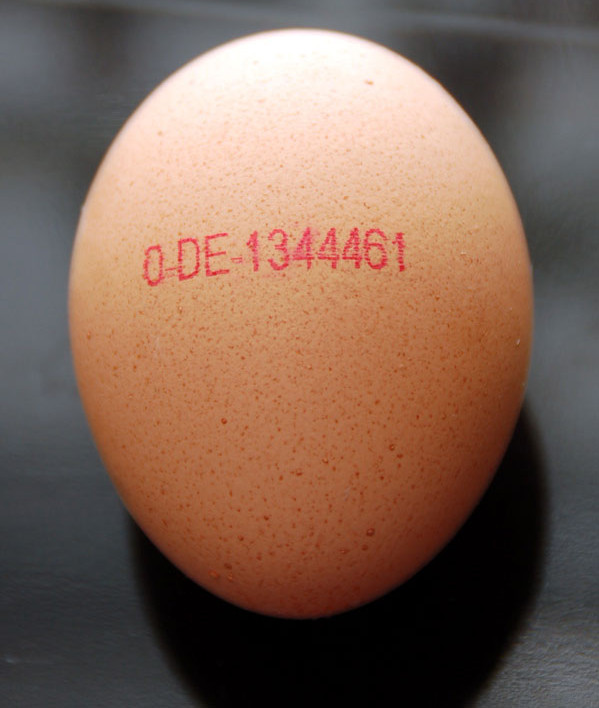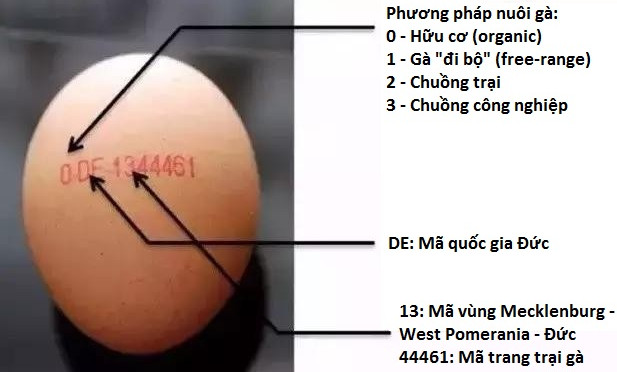Chicken eggs also have identity cards, you know?
When stepping into any supermarket in European Union countries to buy chicken eggs, you can easily "read" the parents, hometown, relatives . of each egg.
Each year, the British eat 10.5 billion eggs, equivalent to 179 eggs for each person. What a terrible number, right?
But one more amazing thing is that every egg they buy in the market or official distribution forms has a clear background, there is no "criminal record".
Any egg with a European Union (EU) or UK nationality will be issued a personal identity card before being distributed to the market.

Any egg from the UK will be issued a personal identification card before being distributed to the market.
Since 2004, all eggs distributed in the EU must be stamped with the most basic information such as the method of raising chickens, nationality and even pens, farms where eggs are laid.
Farm owners can also add logos, international certifications or other farm label information, but basic information is always required to be complete and recognizable. If a farm owner owns many different chicken houses, each cage must be stamped separately.

Since 2004, all eggs distributed in the EU must be stamped with the most basic information.
On the "identity card" of chicken eggs, each symbol helps consumers determine their origin.
The first number is replaced with the "parent information" section of the egg, numbered from 0 to 3, with each number corresponding to a different method of raising chickens. Whereby:
- 0 - Organic farming method
- 1 - Chicken released freely, not kept in captivity
- 2 - Chicken raised in an agricultural farm or in a home
- 3 - Chicken raised in an industrial barn
This information makes it easy for buyers to choose the type of egg that suits their needs. Egg prices also change in order from high to low. Organic chickens produce eggs with higher nutritional value and of course, many times more than industrial chicken eggs.
For the same reason, in Saxony Germany had a period of over 150 chicken farms banned from production. Since every chicken house must be marked separately, the farm owner has secretly put eggs in industrial cages into organic cages to raise egg prices, violating federal consumer protection laws.

Each symbol helps consumers determine their origin.
The next two letters denote the nationality of chicken eggs are specified by the ISO national coding system. In the picture, DE is the country code of Germany. Each country of this system has its own code, for example AT is Austria, NL is the Netherlands, FR is France, CY represents Cyprus eggs.
As a result, consumers can know whether they are using domestic goods or imported goods. The remaining digits indicate the exact birth address of the eggs, the eggs laid on the farm, the cage, and the area .

Information from eggshell, inspection agencies can easily handle chicken farms producing poor quality eggs.
Thanks to information from eggshells, inspection agencies can easily handle chicken farms producing poor quality eggs, a great way to ensure food hygiene and safety.

Chicken eggs, duck eggs must be stamped with each fruit.
Most recently in 2011, Australia and New Zealand began applying this method to the food safety control process.
Accordingly, eggs, duck eggs must be stamped with each fruit, do not use a batch or stamped machine in a carton box to increase traceability in the case of chicken eggs causing health problems.
- Why chicken eggs have two colors and the reason is unexpected
- 10 interesting things about chicken eggs
- What happens when you eat raw chicken eggs?
- Tiny, oddly shaped but this chicken egg can sell for 15 million VND
- Chicken eggs are in chicken eggs
- Vietnam successfully created eggs rich in Omega-3 eggs
- Stunned with chicken eggs '2 in 1'
- Quite eggs are better than chicken eggs
- Chicken eggs contain other eggs inside
- 10 not right concepts when eating eggs
- Very rare eye round eggs
- What few people know about the number of chicken eggs we still eat every day
 'Fine laughs' - Scary and painful torture in ancient times
'Fine laughs' - Scary and painful torture in ancient times The sequence of numbers 142857 of the Egyptian pyramids is known as the strangest number in the world - Why?
The sequence of numbers 142857 of the Egyptian pyramids is known as the strangest number in the world - Why? Miracle behind the world's largest stone Buddha statue
Miracle behind the world's largest stone Buddha statue What is alum?
What is alum?